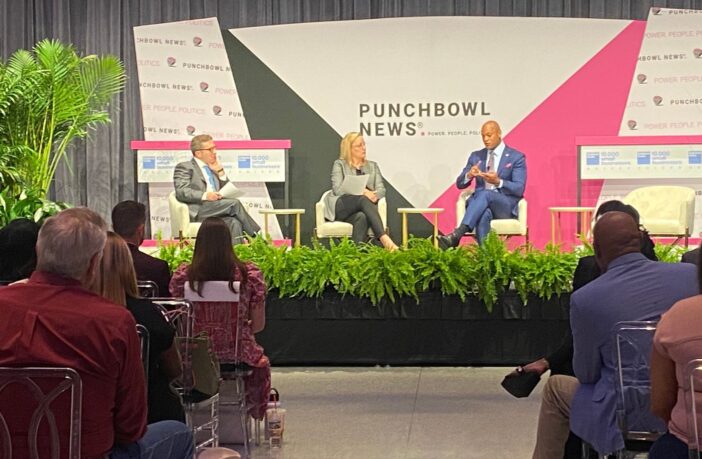By Tashi McQueen
AFRO Political Writer
tmcqueen@afro.com
Maryland Gov. Wes Moore (D) spoke at a fireside chat on Maryland’s small businesses community and the future of the state’s economy on July 29.
Maryland Gov. Wes Moore (D) answers questions on Maryland’s economy by Jake Sherman (left) and Anna Palmer, founders of Punchbowl News, at a fireside chat on July 29.
Photo credit: AFRO News/Tashi McQueen
“We have some of the best entrepreneurs in the country, here in our state. We have some of the top institutions of higher education. The problem is we have not had a strategic plan,” said Moore. “We frankly made it far too difficult for a lot of our small businesses to be able to succeed. It’s far too difficult in the way that people have to go through the permitting and regulatory process. It’s far too difficult when it comes to basic access to capital.”
Moore spoke on his work to help those striking out into business on their own.
“We’ve tried to put together that strategic plan and level the playing field. One of the first things we started doing was working on procurement reform,” continued Moore. “ had significant capital coming from the state, but we never were able to actually come up with real procurement policies.”
Moore highlighted an issue within the state procurement process his administration is currently addressing.
“Oftentimes when come up with procurement goals we allow things like free waivers to go through and allow people to make excuses like ‘well I made a good faith effort to find someone I could work with.’ Good-faith effort is not good enough. You’ve got to work harder.”
According to a 2021 small business profile by the U.S. Small Business Administration Office of Advocacy, Maryland has about 618,000 small businesses, 36 percent of them being minority-owned.
Moore was also asked how his administration is working to build wealth in minority communities.
“The racial wealth gap has cost this country $16 trillion in GDP over the past two decades,” said Moore. “We have and have had a real focus to say if you actually want to have a growing economy, you’ve got to have a participatory economy.”
Moore highlighted the work he’s done in countering the impacts of racial policies that have held minorities back from attaining and maintaining wealth in Maryland. That work includes a massive housing package that he sponsored and signed into law this year and 175,000 pardons for convictions of possession of cannabis post-legalization in Maryland.
He went on to speak about how crucial it is for Maryland to begin receiving federal funds for the costs of rebuilding the Francis Scott Key Bridge this year. President Joe Biden (D) pledged that the federal government would cover the full costs of the bridge shortly after the collapse.
“It’s imperative because the bridge is a crucial artery for the Port of Baltimore, and the Port of Baltimore is an absolute crucial element to our American economy,” said Moore. “If you’re buying spices or sugar or coal, chances are that’s coming through the Port of Baltimore.”
According to the Peterson Institute for International Economics, The Port of Baltimore handled about $7 billion worth of trade in April 2023, which was about 4.4 percent of all U.S. imports and 3.3 percent of all U.S. exports that month.
Moore also pointed out that hazmat materials and oil trucks are not able to go through tunnels which is the quickest alternative route for most vehicles right now.
“The sole lane for them to go to the Port of Baltimore is now collapsed,” said Moore.
“We have to get moving now,” said Moore. “If we can get this done with bipartisan support from Congress, we will have that bridge built in 2028. We’re going to do something so spectacular that the entire country is going to see just how Maryland moved and the entire country will be very proud about what Maryland got done.”
Maryland business owners Teara Strum, CEO of Strum Contracting, and Brendan McCulsky, founder of Trident Builders, commented on Moore’s efforts concerning small businesses in the state.
“The governor has often said that this is going to be Maryland’s decade and I think he’s right,” said McCulsky. “I think the governor’s leadership has been providing the framework to allow people like us to be successful.”
McCulsky continued saying the governor’s work has created an ecosystem where Maryland’s small business owners can feel comfortable leaping into various business ventures.
“Some of the policies and the things that he’s creating at the state level are truly trickling down to the mom and pop small businesses we have here in Maryland today,” said Strum.
She highlighted a project that Strum and Trident are working on together that was made possible in part through a state provided fund, which helps small businesses enter the cannabis industry.
“We have 26 subcontractors. Fifteen of them are minority and women-owned business enterprises,” said Strum.



